“Other Desert Cities” is a gripping drama by Jon Robin Baitz‚ set during Christmas in Palm Springs․ It explores family tensions and political divides through Brooke Wyeth’s explosive memoir‚ sparking conflict and introspection among the Wyeth family․
1․1 Overview of the Play
“Other Desert Cities” by Jon Robin Baitz is a compelling drama set in Palm Springs during Christmas․ The story revolves around Brooke Wyeth‚ a liberal writer‚ who returns home after six years with a controversial memoir․ This manuscript reveals a devastating family secret‚ causing tension among her conservative parents‚ Lyman and Polly‚ and her siblings‚ Trip and Silda․ The play delves into themes of family dynamics‚ political ideologies‚ and personal identity‚ creating a gripping narrative of conflict and introspection․ It explores how truth and deception shape relationships‚ making it a thought-provoking exploration of human complexity․
1․2 Historical Context and Setting
The play is set in 2004 during the Iraq War‚ a time of heightened political tension in the United States․ The story unfolds in the Wyeth family home in Palm Springs‚ California‚ a location symbolic of conservatism and luxury․ This setting contrasts sharply with the liberal views of Brooke Wyeth‚ creating a backdrop of ideological conflict․ The desert locale also serves as a metaphor for isolation and moral dryness‚ reflecting the emotional distance within the family․ The historical context of war and political division amplifies the play’s exploration of family dynamics and ideological clashes․
1․3 Cultural Significance of the Play
“Other Desert Cities” holds significant cultural relevance by addressing themes of family conflict‚ political polarization‚ and personal identity․ Set during the Iraq War‚ the play reflects the societal divisions of the time‚ resonating with audiences grappling with similar ideological clashes․ Its exploration of truth‚ deception‚ and forgiveness offers a universal commentary on human relationships and the challenges of reconciling differing beliefs․ The play’s ability to blend personal and political narratives makes it a compelling reflection of contemporary cultural struggles‚ fostering empathy and understanding through its nuanced portrayal of a fractured family․
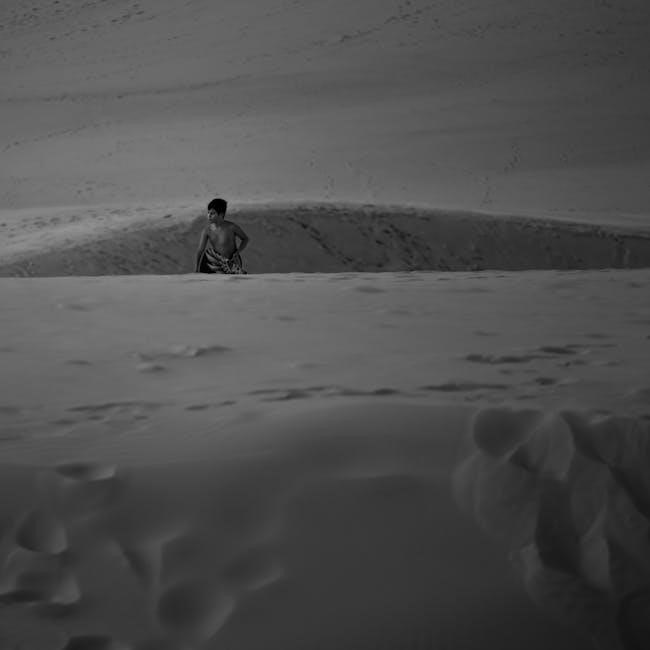
Background of the Playwright ౼ Jon Robin Baitz
Jon Robin Baitz is a renowned playwright and screenwriter known for his nuanced exploration of complex themes‚ blending political commentary with deeply personal narratives‚ earning critical acclaim․
2․1 Biography of Jon Robin Baitz
Jon Robin Baitz‚ born in 1961 in Los Angeles‚ California‚ is a celebrated American playwright and screenwriter․ He studied at Juilliard and gained recognition for his early plays like The End of the Day in the 1980s․ Baitz’s work often explores complex themes‚ blending political commentary with personal narratives; His plays‚ such as Other Desert Cities‚ have earned critical acclaim for their nuanced character development and emotional depth․ Baitz has also contributed to television‚ further showcasing his storytelling prowess and versatility as a writer․
2․2 His Contribution to Theatre
Jon Robin Baitz has significantly enriched American theatre through his thought-provoking plays․ His works‚ such as Other Desert Cities‚ delve into complex themes like family dynamics and ideological conflicts‚ resonating deeply with audiences․ Baitz’s ability to craft emotionally charged narratives has earned him recognition‚ including numerous award nominations․ His contributions have not only advanced contemporary theatre but also inspired new playwrights to explore nuanced storytelling‚ making him a pivotal figure in modern drama․
2․3 Major Themes in His Works
Jon Robin Baitz’s plays often explore themes of family dynamics‚ political ideologies‚ and personal identity․ His works delve into the complexities of human relationships‚ revealing tensions between generations and conflicting viewpoints․ Baitz also examines the struggle for truth and the impact of deception‚ creating characters that grapple with moral dilemmas․ His ability to weave these themes into compelling narratives has made his plays resonate with audiences‚ offering a deeper understanding of societal and familial challenges․

Plot Summary of “Other Desert Cities”
The play revolves around Brooke Wyeth’s return to her family’s Palm Springs home with a controversial memoir‚ uncovering secrets and sparking intense family conflicts and emotional reckonings․
3․1 Setting and Time Period
The play is set in the luxurious Wyeth family home in Palm Springs‚ California‚ during Christmas 2004․ This desert city serves as a backdrop for the family’s internal conflicts and political tensions․ The setting reflects the isolation and harsh realities faced by the characters‚ while the time period underscores the post-9/11 and Iraq War era‚ adding layers of ideological strife․ The contrast between the serene desert landscape and the family’s turbulent dynamics heightens the emotional depth of the story․ The specific time and place are crucial to the play’s exploration of identity‚ politics‚ and family secrets․
3․2 Main Characters and Their Roles
Brooke Wyeth is the protagonist‚ a liberal novelist returning home after six years‚ whose memoir reveals family secrets․ Lyman‚ the patriarch‚ is a conservative actor‚ while Polly‚ the matriarch‚ exudes sharp wit and control․ Silda‚ Polly’s sister‚ is recovering from addiction and offers humor․ Trip‚ Brooke’s brother‚ manages the family dynamics with sarcasm․ Each character’s distinct perspective fuels the play’s tension and emotional depth‚ creating a complex web of relationships and ideological clashes that drive the story forward․
3․3 Key Plot Points and Conflicts
The play centers on Brooke Wyeth’s return to her family’s Palm Springs home after six years‚ carrying a memoir that exposes a long-hidden family secret․ Her parents‚ Lyman and Polly‚ are shocked by the revelation‚ leading to intense confrontations․ Lyman struggles with the truth about his past‚ while Polly defends her actions with sharp wit․ Meanwhile‚ Brooke’s brother‚ Trip‚ mediates the chaos‚ and her aunt‚ Silda‚ adds humor but also her own perspective․ The memoir becomes a catalyst for unresolved tensions‚ forcing the family to confront their ideologies‚ loyalties‚ and the cost of truth․

Characters in “Other Desert Cities”
The play revolves around the Wyeth family‚ including Brooke‚ Lyman‚ Polly‚ Silda‚ and Trip‚ each navigating complex dynamics‚ political clashes‚ and personal secrets with distinct perspectives․
4․1 Brooke Wyeth ౼ The Protagonist
Brooke Wyeth‚ the protagonist‚ is a liberal East Coast writer who returns to her conservative family’s Palm Springs home․ Her memoir reveals a devastating family secret‚ causing tension and conflict․ Brooke’s journey explores her struggle for identity‚ truth‚ and reconciliation with her past․ Her character embodies the clash between personal expression and family loyalty‚ making her the emotional core of the play․ Through her‚ Baitz delves into themes of truth‚ forgiveness‚ and the complexities of family relationships․ Her presence drives the narrative forward‚ shaping the dynamics of the Wyeth family․
4․2 Lyman Wyeth ー The Patriarch
4․3 Polly Wyeth ౼ The Matriarch
Polly Wyeth‚ the matriarch‚ is a sharp-tongued‚ politically conservative woman who exudes control and precision․ As Lyman’s wife and the family’s emotional anchor‚ Polly is fiercely protective of her family’s image․ Her complex relationship with her children‚ especially Brooke‚ is marked by both love and criticism․ Polly’s rigid adherence to her beliefs often clashes with her children’s liberal views‚ creating tension․ Her character highlights the struggles of maintaining family unity while holding onto personal values‚ making her a compelling and multifaceted figure in the play․
4․4 Silda Grauman ౼ The Sister
Silda Grauman‚ Brooke’s aunt‚ is a sharp-witted‚ recovering alcoholic who brings humor and insight to the family dynamics․ Her biting remarks and observational humor often cut through the tension‚ revealing her own vulnerabilities․ Silda’s relationship with Polly is particularly strained‚ reflecting their shared history and unresolved conflicts․ Despite her flaws‚ Silda is a source of support for Brooke‚ offering a counterbalance to Polly’s rigid conservatism․ Her presence adds depth and complexity to the family’s interactions‚ making her a pivotal character in the play’s emotional landscape․
4․5 Trip Wyeth ౼ The Brother
Trip Wyeth‚ the youngest sibling‚ is a laid-back‚ often detached observer of his family’s conflicts․ His role as a TV producer has made him pragmatic‚ seeking to mediate rather than confront․ Trip tries to maintain peace‚ often caught between Brooke’s liberal ideals and their parents’ conservatism․ His humor and casual demeanor mask his own struggles with identity and purpose‚ making him a relatable figure in the family’s chaotic dynamics․ Trip’s loyalty to his family is unwavering‚ yet he grapples with finding his own place within their fractured relationships․

Themes in “Other Desert Cities”
The play explores family dynamics‚ political conflicts‚ identity‚ and truth‚ delving into the emotional and intellectual tensions within the Wyeth family‚ highlighting their complex relationships and ideologies․
5․1 Family Dynamics and Relationships
The Wyeth family’s interactions are fraught with tension and emotional depth․ Brooke’s return home after six years triggers old conflicts‚ revealing strained relationships and unresolved issues․ Her conservative parents‚ Lyman and Polly‚ struggle with her liberal views‚ while her siblings‚ Trip and Silda‚ navigate their own roles within the family․ The manuscript Brooke brings exposes secrets‚ forcing each member to confront their past and their connections to one another․ This dynamic interplay of love‚ resentment‚ and loyalty underscores the complexity of family bonds in the play․ The dialogue is sharp and revealing‚ highlighting the characters’ inner worlds and their often unspoken emotions․ Through these interactions‚ Baitz masterfully portrays how families both unite and divide‚ creating a rich tapestry of human relationships․ The Palm Springs setting amplifies the isolation and claustrophobia‚ making the family’s struggles even more intense and personal․ As the story unfolds‚ the characters are compelled to face truths they have long avoided‚ leading to a dramatic and emotionally charged confrontation․ Ultimately‚ the play suggests that while family ties can be both a source of strength and pain‚ they are an integral part of who we are․ The exploration of these dynamics makes “Other Desert Cities” a poignant and thought-provoking examination of family life․ The ways in which the Wyeths interact and confront their differences serve as a microcosm for broader societal issues‚ adding depth to the narrative․ The play’s focus on the intricacies of family relationships ensures that audiences can relate to the characters’ struggles and reflect on their own experiences․ In doing so‚ Baitz creates a narrative that is both deeply personal and universally resonant‚ making “Other Desert Cities” a compelling exploration of the human condition․
5․2 Political and Ideological Conflicts
The play delves into the ideological divide between Brooke‚ a liberal writer‚ and her conservative parents‚ Lyman and Polly․ Brooke’s memoir reveals her leftist views‚ clashing with her parents’ Republican values․ The family’s political tensions mirror the broader societal polarization of the early 2000s․ Set in 2004 Palm Springs‚ the play touches on themes like the Iraq War and political activism․ The manuscript Brooke brings home becomes a catalyst for these conflicts‚ exposing deep-seated disagreements․ The dialogue highlights the emotional and intellectual struggles of a family torn apart by differing beliefs․ This ideological clash drives the play’s dramatic tension‚ reflecting real-world political divides․ The Wyeths’ debates over morality‚ loyalty‚ and truth underscore the personal cost of political differences․ Through this‚ Baitz critiques the rigidity of ideological positions and the challenges of bridging such gaps within families․ The play ultimately portrays how political conflicts can both unite and fracture relationships‚ leaving lasting scars․ The exploration of these tensions adds depth to the narrative‚ making it a powerful commentary on contemporary American society․ The ideological struggles within the Wyeth family serve as a microcosm for the broader political polarization of the time‚ resonating with audiences on a personal and societal level․ The play’s ability to balance these themes with emotional complexity ensures its relevance and impact․ The political and ideological conflicts in “Other Desert Cities” are not just a backdrop but a driving force behind the characters’ journeys and the play’s dramatic arc․
5․3 Identity and Belonging
Identity and belonging are central themes in “Other Desert Cities‚” as Brooke Wyeth grapples with reconciling her East Coast liberal identity with her Palm Springs upbringing․ Her return home forces her to confront her roots and the conservative values of her family․ The tension arises as Brooke seeks acceptance for her choices‚ while her parents struggle to understand her perspective․ This internal conflict reflects broader societal identity struggles․ The play explores how family dynamics shape individual identity and the challenges of belonging when personal beliefs clash with familial expectations․ Through Brooke’s journey‚ the play highlights the universal quest for self-definition and the complexity of maintaining relationships while staying true to oneself․ The struggle for identity and belonging is deeply intertwined with the political and emotional conflicts‚ making it a compelling aspect of the narrative․ The Wyeth family’s dynamics illustrate how identity can both unite and divide‚ leaving lasting emotional scars․ The exploration of these themes adds depth to the play‚ offering audiences a relatable and thought-provoking experience․ The interplay between identity and belonging serves as a cornerstone for the characters’ development and the play’s emotional resonance․
5․4 Truth and Deception
Truth and deception are pivotal in “Other Desert Cities‚” as Brooke Wyeth’s memoir uncovers a long-buried family secret․ The play explores the tension between revealing painful truths and preserving comforting illusions․ Brooke’s manuscript forces her family to confront their past‚ leading to emotional turmoil and accusations of betrayal․ The Wyeths struggle with the consequences of honesty‚ questioning whether some truths are better left unspoken․ The play delves into the complexity of deception‚ highlighting how lies can both protect and destroy relationships․ Through this lens‚ Baitz examines the moral ambiguity of truth-telling and its impact on family dynamics․ The interplay between revelation and concealment drives the plot‚ revealing the fragility of trust and the enduring power of secrets․ The characters’ responses to Brooke’s memoir expose their own fears and vulnerabilities‚ illustrating the subjective nature of truth․ Ultimately‚ the play leaves audiences questioning the ethics of exposing truths versus preserving peace․ The exploration of truth and deception adds depth to the narrative‚ making it a thought-provoking commentary on human relationships and moral dilemmas․
5․5 Redemption and Forgiveness
Redemption and forgiveness are central themes in “Other Desert Cities‚” as Brooke Wyeth’s memoir forces her family to confront past wounds․ The play explores the possibility of redemption through truth‚ even when it causes pain․ Brooke seeks validation and forgiveness for her actions‚ while her parents grapple with their own guilt and regret․ The tension between accountability and mercy underscores the emotional complexity of the Wyeth family’s dynamics․ Through their struggles‚ the play suggests that forgiveness is a difficult but necessary path toward healing and reconciliation․ Ultimately‚ it leaves audiences reflecting on the power of redemption in fractured relationships․
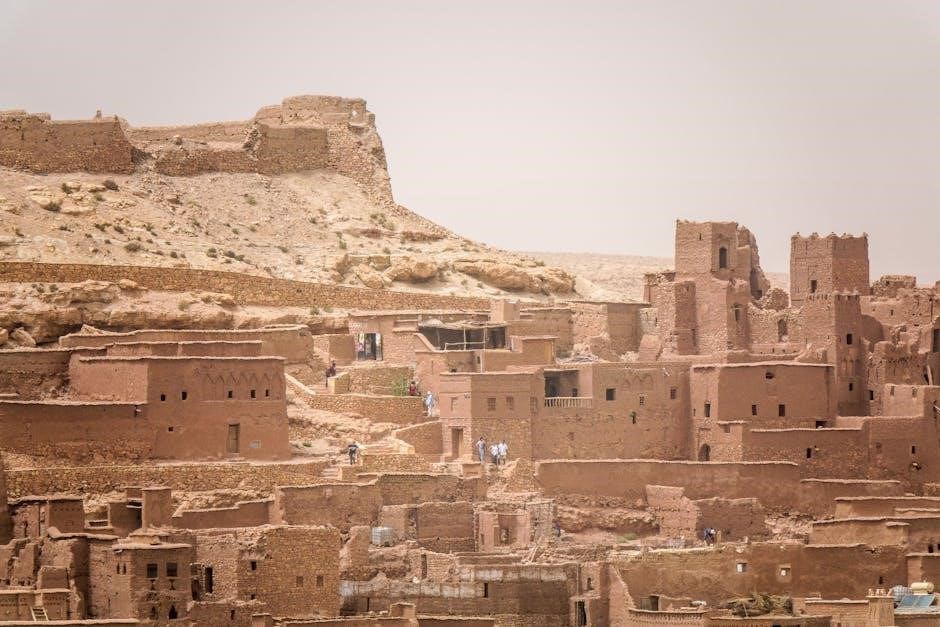
Symbolism in the Play
The desert symbolizes isolation and harsh realities‚ while the Wyeth home represents the family’s tangled past․ Brooke’s manuscript embodies truth and its explosive impact on relationships․
6․1 The Desert as a Symbol
The desert in “Other Desert Cities” symbolizes isolation and the harsh‚ unforgiving nature of the characters’ emotional landscapes․ Set in Palm Springs‚ the arid environment reflects the family’s dry‚ strained relationships and the desolation of their unresolved conflicts․ The desert also serves as a backdrop for reflection‚ mirroring Brooke’s internal struggle as she confronts her past and the truth she reveals in her memoir․ Its vastness underscores the emotional distance between the characters‚ while its beauty hints at the complexity of their intertwined lives and the secrets buried beneath the surface․ The desert becomes a metaphor for both alienation and the search for truth․
6․2 The Wyeth Family Home
The Wyeth family home in “Other Desert Cities” serves as both a physical and symbolic space‚ embodying the tension and secrets within the family․ Set in Palm Springs‚ the luxurious home represents the facade of perfection the Wyeths strive to maintain․ However‚ it also acts as a trap‚ holding them hostage to their past conflicts and unspoken truths․ The home becomes a battleground where political and personal ideologies clash‚ particularly when Brooke’s memoir threatens to expose long-buried family secrets․ Its opulent yet stifling environment mirrors the characters’ emotional entrapment and their struggle to reconcile their identities․ The home symbolizes both comfort and confinement‚ highlighting the complexities of family dynamics and the weight of unresolved history․
6․3 The Manuscript as a Symbol of Truth
The manuscript in “Other Desert Cities” symbolizes the explosive truth that Brooke Wyeth unveils about her family’s past․ Her memoir‚ detailing a tragic event‚ forces the Wyeths to confront their buried secrets and ideological divides․ The manuscript becomes a catalyst for conflict‚ exposing lies and revealing the fragility of their relationships․ It represents Brooke’s quest for authenticity and her desire to break free from the family’s polished facade․ Through the manuscript‚ Baitz explores the power of truth to both wound and heal‚ making it a central symbol of the play’s themes of deception and redemption․
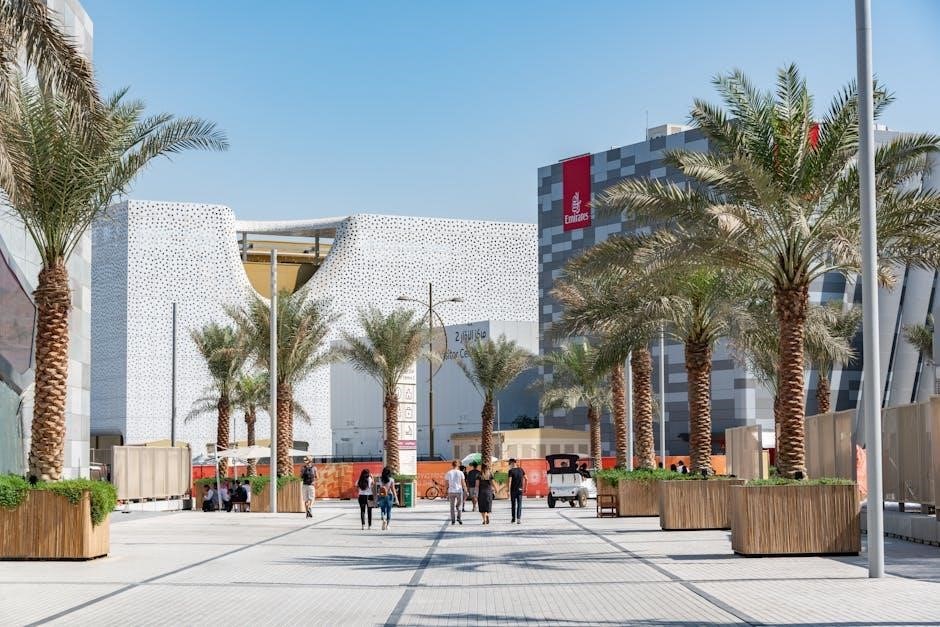
Critical Analysis of the Play
Critics acclaim “Other Desert Cities” for its explosive drama‚ sharp dialogue‚ and nuanced exploration of family dynamics․ The play’s balanced tone blends humor with tense ideological conflicts‚ resonating deeply with audiences․
7․1 Reception by Critics and Audiences
“Other Desert Cities” received widespread critical acclaim for its sharp dialogue and emotional depth․ Audiences praised its nuanced portrayal of family dynamics and ideological conflicts․ Critics highlighted its ability to balance humor with intense drama‚ making it a standout production․ The play resonated deeply with viewers‚ sparking conversations about truth‚ identity‚ and redemption․ Its international performances further cemented its reputation as a powerful and thought-provoking work of contemporary theatre․
7․2 Dramatic Structure and Style
Joy Robin Baitz’s “Other Desert Cities” employs a tightly wound dramatic structure‚ set in a single location over a short time frame․ The play’s realistic style emphasizes sharp‚ witty dialogue that reveals character complexities and ideological clashes․ Act 1 lays the groundwork for familial tensions‚ while Act 2 escalates conflicts‚ culminating in a emotionally charged climax․ Baitz’s mastery of dialogue drives the narrative‚ blending humor with poignant revelations․ The structure mirrors the characters’ psychological unraveling‚ creating a compelling exploration of truth‚ identity‚ and family dynamics․
7․3 Use of Dialogue and Language
The dialogue in “Other Desert Cities” is sharp and evocative‚ reflecting the characters’ complex personalities and ideological tensions․ Baitz’s language balances wit with emotional depth‚ revealing underlying conflicts through subtle exchanges․ The play’s conversational style creates a sense of authenticity‚ while its poetic undertones elevate the narrative․ Dialogue serves as a tool for character revelation‚ exposing truths and misunderstandings․ This interplay of humor and poignancy captivates audiences‚ making the language a key element in the play’s emotional resonance and thematic exploration․
Adaptations and Performances
“Other Desert Cities” premiered on Broadway in 2011‚ earning critical acclaim and a Tony nomination․ Its success led to international productions‚ featuring notable actors and further solidifying its reputation․
8․1 Broadway Production
The Broadway production of “Other Desert Cities” opened in 2011 at the Booth Theatre‚ directed by Joe Mantello․ It starred Stockard Channing‚ Rachel Griffiths‚ and Stacy Keach‚ earning a Tony Award nomination for Best Play․ The production received critical acclaim for its intense performances and thought-provoking dialogue‚ further solidifying the play’s reputation as a modern theatrical masterpiece․
8․2 International Performances
“Other Desert Cities” has gained international acclaim‚ with productions in London’s West End and Australia․ The play’s universal themes resonate globally‚ adapting seamlessly to diverse cultural contexts․ Its exploration of family dynamics and political tensions transcends borders‚ making it a hit worldwide․ Performances have been praised for their emotional depth‚ showcasing the play’s ability to connect with audiences across continents․ This global success highlights its relevance and appeal beyond American audiences‚ solidifying its place in contemporary theatre․
8․4 Notable Actors and Their Roles
Rachel Griffiths and JoBeth Williams delivered standout performances as Brooke and Polly Wyeth in various productions․ The Broadway production featured Stockard Channing as Polly‚ earning acclaim for her portrayal․ Stacy Keach also shone as Lyman Wyeth‚ bringing depth to the role․ These actors brought nuance to their characters‚ capturing the play’s emotional complexity․ Their performances were widely praised‚ highlighting the play’s appeal to both audiences and critics․ The cast’s talent elevated the story‚ making it a memorable experience in contemporary theatre․
Educational Resources and PDFs
The play is available in PDF format‚ along with study guides and analysis‚ making it accessible for educational purposes and fostering deeper understanding of its themes and characters․
9․1 Availability of the Play in PDF Format
The play Other Desert Cities by Jon Robin Baitz is widely available in PDF format‚ making it accessible for readers and educators․ It can be downloaded from various online retailers‚ academic databases‚ and theatrical resource websites․ The PDF version ensures easy access for study and performance purposes‚ allowing audiences to engage with the script digitally․ This format has become popular among students and theatregoers‚ facilitating deeper analysis of the play’s themes‚ characters‚ and dramatic structure․ Its availability has also enabled widespread educational use in schools and universities․
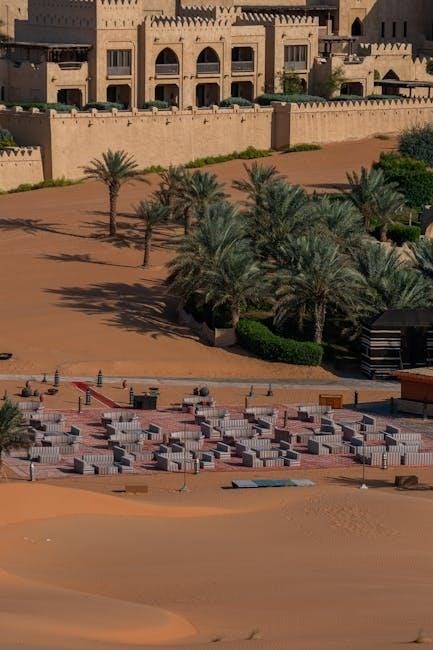
9․2 Study Guides and Analysis
Study guides and analyses for Other Desert Cities provide in-depth insights into the play’s themes‚ characters‚ and dramatic structure․ These resources are available online and in educational materials‚ offering detailed breakdowns of key scenes‚ character motivations‚ and symbolic elements․ They also explore the play’s cultural and political undertones‚ making them invaluable for students and scholars․ Many guides include discussion questions‚ historical context‚ and critical perspectives‚ enhancing understanding of the play’s complex dynamics and its relevance to contemporary issues․
9․3 Educational Uses of the Play
Other Desert Cities is widely used in educational settings to teach drama‚ literature‚ and critical thinking․ Its complex characters and themes‚ such as family dynamics and political conflict‚ make it ideal for classroom discussions․ The play’s PDF availability allows easy access for students and educators․ It is often incorporated into curriculum for courses on American theatre‚ contemporary drama‚ and social issues․ Teachers use it to explore themes of identity‚ morality‚ and the impact of personal choices‚ fostering analytical and reflective learning experiences among students․
Comparison with Other Works
Other Desert Cities shares themes of family conflict and political tension with works like August: Osage County‚ but its unique Palm Springs setting and memoir-driven plot set it apart․
10․1 Similar Themes in Other Plays
Other Desert Cities explores themes of family dynamics‚ political ideology‚ and personal identity‚ which are also central to plays like August: Osage County and The Glass Menagerie․ These works similarly delve into the complexities of family relationships and the clash of values across generations․ Additionally‚ the tension between truth and deception in Other Desert Cities mirrors plays like Who’s Afraid of Virginia Woolf? and Long Day’s Journey into Night‚ where secrets and illusions drive the narrative․ These parallels highlight the universality of such themes in modern theatre․
10․2 Influence of “Other Desert Cities” on Contemporary Theatre
Other Desert Cities has left a significant mark on contemporary theatre by addressing complex family dynamics and political tensions․ Its nuanced exploration of ideological conflicts has inspired playwrights to tackle similar themes‚ fostering a deeper exploration of personal and societal divides․ The play’s sharp dialogue and layered characters have raised the bar for dramatic storytelling‚ influencing modern plays to embrace bold‚ emotionally charged narratives․ Its success has also encouraged adaptations and reinterpretations‚ cementing its role in shaping the direction of contemporary drama․
“Other Desert Cities” resonates deeply with audiences‚ offering a poignant exploration of family‚ politics‚ and identity․ Its thought-provoking themes ensure its lasting relevance in contemporary theatre․
11․1 Impact of the Play on Audiences
“Other Desert Cities” leaves audiences emotionally resonant‚ compelling them to reflect on family dynamics and ideological divides․ Its raw portrayal of personal and political conflicts strikes a chord‚ fostering empathy and introspection․ The play’s ability to balance humor with drama creates a relatable yet profound experience‚ making it a memorable and thought-provoking theatrical encounter for viewers․
11․2 Legacy of “Other Desert Cities”
“Other Desert Cities” has carved a lasting place in contemporary theatre‚ celebrated for its nuanced exploration of family and politics․ Its critical acclaim and resonance with audiences have solidified its reputation as a powerful drama․ The play’s themes of truth‚ identity‚ and forgiveness continue to influence modern storytelling‚ ensuring its relevance for future generations․ Its legacy lies in its ability to provoke thought and emotional connection‚ making it a significant work in the theatrical landscape․
11․3 Final Thoughts on the Play’s Relevance
“Other Desert Cities” remains a poignant reflection of familial and societal dynamics․ Its exploration of political and personal divides resonates deeply in today’s polarized world․ The play’s ability to balance humor with intense drama makes it universally relatable․ As a commentary on truth and forgiveness‚ it challenges audiences to confront their own biases and relationships․ Its timeless themes ensure that the play will continue to spark important conversations‚ solidifying its place as a relevant and impactful work in modern theatre․
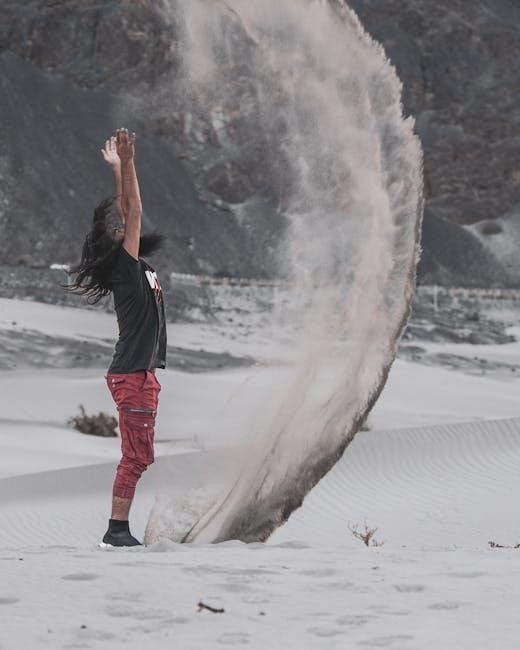
No Responses